The state of Rajasthan is known for its forts and palaces. However, among all the majestic ones, the Chittorgarh Fort, which is the biggest fort in India stands out as one of the most prestigious. This UNESCO World Heritage Site is spread across 691.9 acres. The fort houses 65 historic structures, including 20 water bodies, 19 temples, 4 palaces and 4 memorials. Beyond its architectural marvel, the true beauty of the fort lies in its history, which depicts the bravery and sacrifice of the Rajput warriors since the fort has witnessed several battles.
Quick Details About Chittorgarh Fort
Chittorgarh Fort Address: Chittorgarh, Rajasthan 312001
Chittorgarh Fort Timings: 09:00 AM – 05:00 PM
Chittorgarh Fort Ticket Price: ₹50 for adults, ₹ 25 for children, ₹ 200 for foreigners.
How To Reach Chittorgarh Fort: The nearest airport from Chittorgarh is in Udaipur, the Dabok Airport, located around 90 km away. From there, you can hire a taxi to Chittorgarh, which will take 2 – 3 hours.
Best Time To Visit: The best time to visit this fort is during the winter season, from October to February. During these months, the temperature can go as low as 10°C, making it favourable for you to explore the fort and the nearby sightseeing spots with comfort.
History Of Chittorgarh Fort
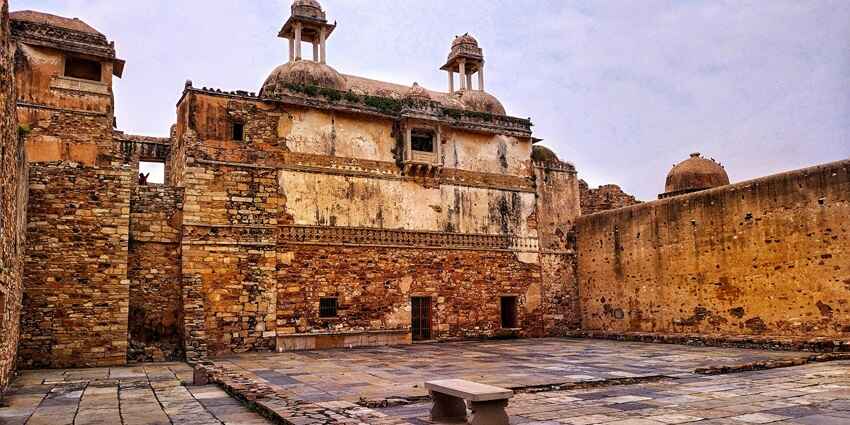
The construction and origin of the Chittorgarh Fort dates back to the existence of the Mewar dynasty. The fort has endured multiple sieges, the most famous being those by Alauddin Khilji in 1303, Bahadur Shah of Gujarat in 1535, and the Mughal emperor Akbar in 1568. Despite these destructive battles, through each one of them, the Rajputs have withstood their ground, fighting back their enemies.
Today, Chittorgarh Fort stands as a historical landmark that features magnificent complexes including palaces, temples, victory towers, reservoirs, and commemorative structures. Each section of the biggest fort in India has a story to unfold, unveiling the turbulent history of Rajasthan.
Suggested Read: Famous Forts In India To Explore For An Amazing Experience
Things To Do At Chittorgarh Fort
Given that Chittorgarh Fort is spread across an area of around 700 acres, there are a lot of significant spots that you need to visit and explore in the fort.
1. Historical Exploration
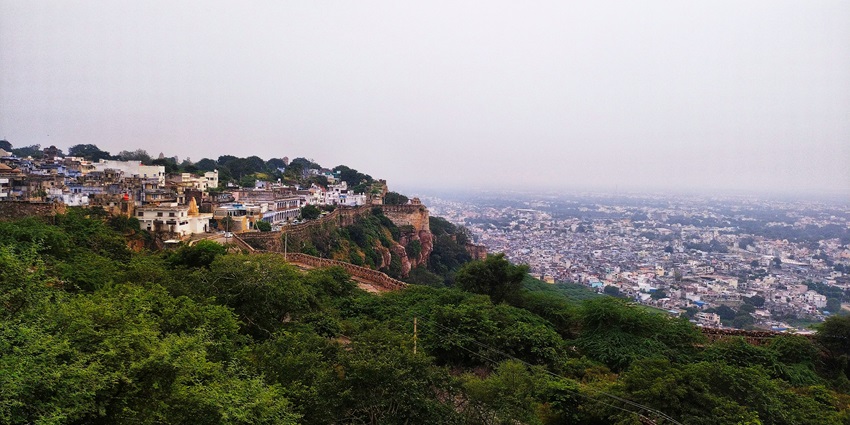
Undoubtedly, the first activity is to explore the biggest fort in India and unveil the historical significance behind it. The best way to learn about the fort’s history, the sieges, and battles is through hiring a knowledgeable guide. As you walk through the individual palaces, temples and complexes around the fort, you get to explore the Rajput influences in those areas. The carvings on the Jain temples and the defensive structures like bastions and gateways add to the historical significance. To further immerse yourself in the fort’s history, visit Chittorgarh Museum and the Fateh Prakash Palace.
2. Visit The Temples
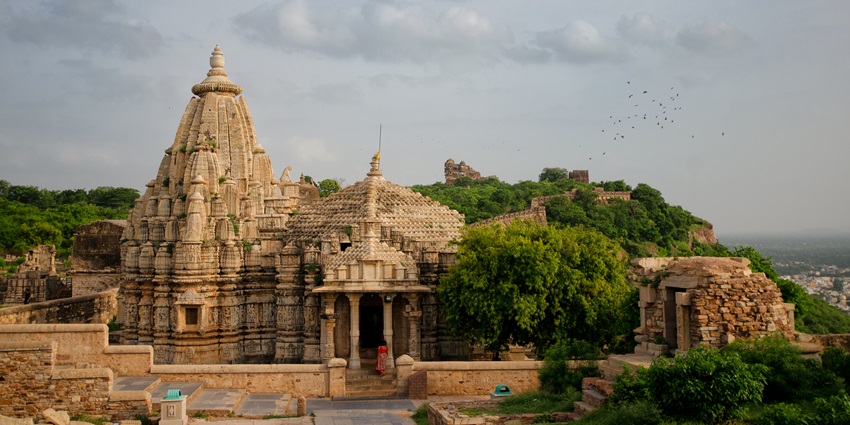
Photo: Ganesh Subramaniam / Wikimedia Commons
Beyond the palaces, one of the most important attractions in the Chittorgarh Fort lies in its temples. Three distinct temples hold maximum importance – Meera Temple, Kalika Mata Temple and Samadhishvara Temple. The Meera Bai temple is dedicated to the poet-saint Meera Bai, a devout follower of Lord Krishna. The Kalika Mata temple dates back to the 8th century and was initially built as a Sun temple, which was later converted into a Kali temple. The Samadhishvara temple is a Jain temple dedicated to the Tirthankara.
Suggested Read: Temples In Rajasthan To Visit On A Religious Trip
3. Admire The Towers In The Fort
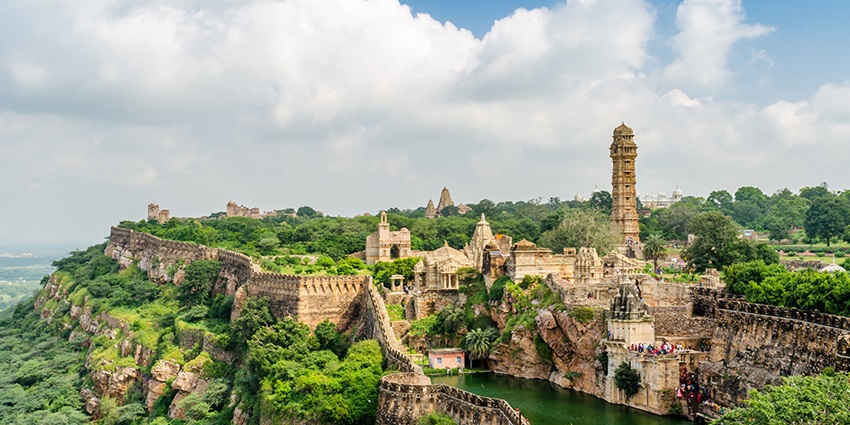
Photo: Chetan1986 / Wikimedia Commons
While most people stay busy admiring the highlights of the Chittorgarh Fort Rajasthan, they often forget many unexplored spots. Among them, the towers of the fort happen to be one. There’s Vijay Stambh and Kirti Stambh. The Victory Tower, aka, Vijay Stambh dates back to 1448 and was constructed by Rana Kumbha to commemorate his win against the armies of Malwa and Gujarat. The Kirti Stambh, on the other hand, was constructed by a Jain merchant in the 12th century and is dedicated to Adinatha, the first Jain Tirthankara.
4. Attend The Light And Sound Show
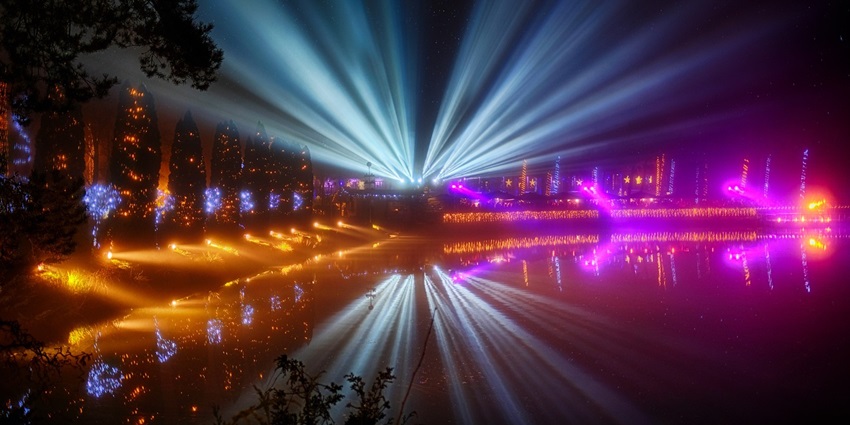
Photo: Bru-nO / Pexels / Image For Representation Only
Another must-have experience at the Chittorgarh Fort is attending their light and sound show. It is conducted during the evening time, offering a rundown of the fort’s history, its elements and also insights into the heroism and sacrifices that the Rajputs have showcased in the past. If you are one of those people who loves learning about a place’s history in a more immersive manner, this is the perfect way to do so.
Suggested Read: Places To Visit In Chittorgarh For Every History Enthusiast
5. Visit The Gaumukh Reservoir
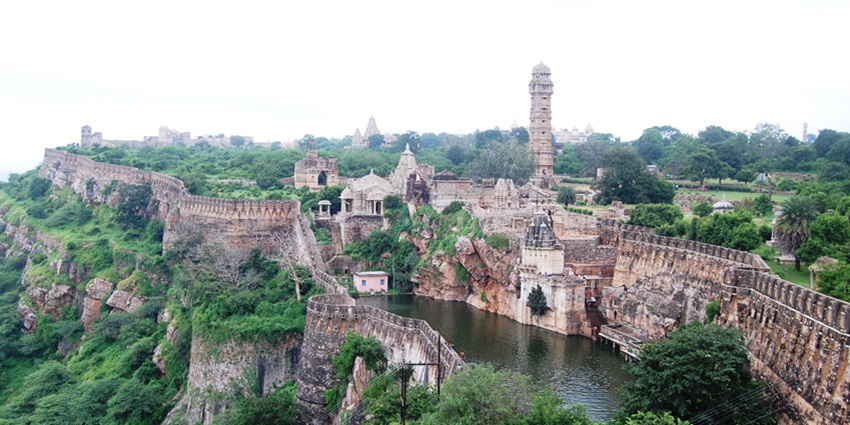
Photo: Ssjoshi111 / Wikimedia Commons
One of the most significant spots to visit and explore in the Chittorgarh Fort is the Gaumukh Reservoir. It is a sacred water tank that resides within the fort and receives the water from a natural spring. The tank is named ‘Gaumukh’ (meaning ‘cow’s mouth’) because the water flows through a rock shaped like a cow’s head. According to historians, this particular site inside the fort is of religious significance and several visitors even take a dip in the sacred water of the tank.
6. Visit The Padmini Palace
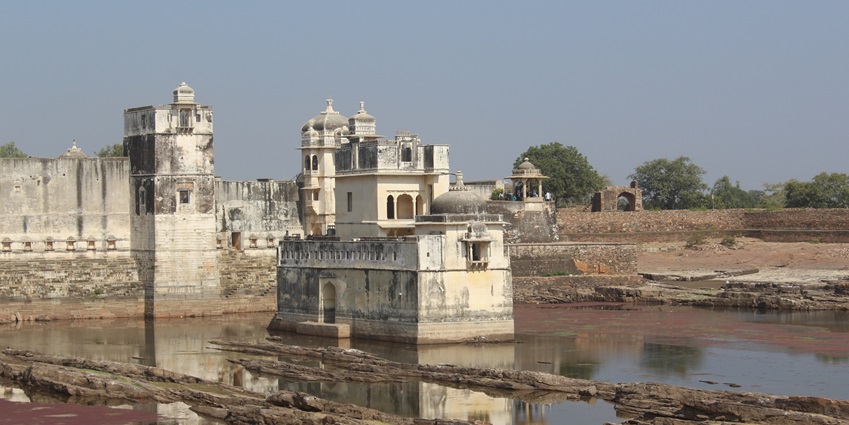
Photo: Sougata Bhar / Wikimedia Commons
There are a lot of controversies and debates surrounding the legend of Rani Padmini. It is a three-storied charming palace that’s painted in pristine white. As you enter inside, the first striking element lies in the traditional Rajput architectural style with ornately carved pillars, arched balconies, and jali work. You can learn more about Rani Padmini from the guides. After visiting the palace, head to the Padmini Johar Smarak located nearby. This memorial commemorates the act of Jauhar, a reminder of the sacrifices made by Rajput women during the siege.
Suggested Read: Things To Do In Chittorgarh
Places To Visit Around Chittorgarh Fort
As you read through the Chittorgarh Fort review, it’s time to make a concrete plan of the places that you will visit around the fort to make the most of your trip.
1. Rana Kumbha Palace
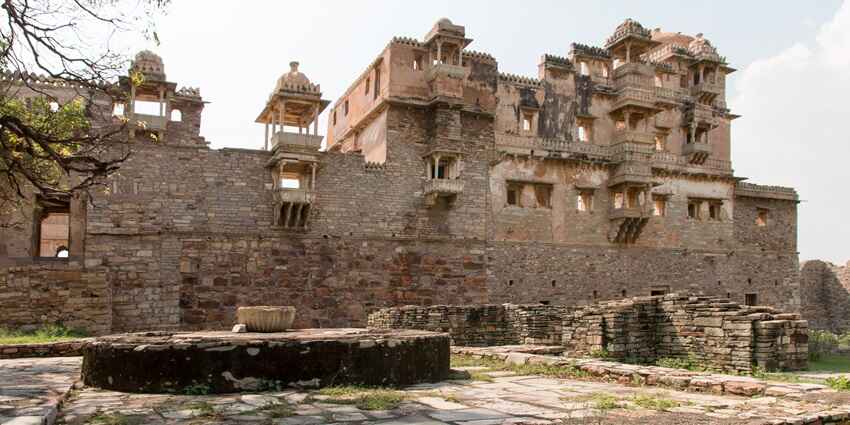
Photo: Daniel Villafruela / Wikimedia Commons
Dating back to the 15th century, Rana Kumbha Palace is known for its architectural grandeur. Located 2 km from the biggest fort in India, the palace is one of the biggest monuments in Chittorgarh at present date. It served as a residence to Bappa Rawal, Maharana Kumbha, Rani Padmini, Princess Meera Bai, etc. Also, there are rumours that the palace is a haunted site.
Distance From The Fort: 2.3 Km
2. Kalika Mata Temple
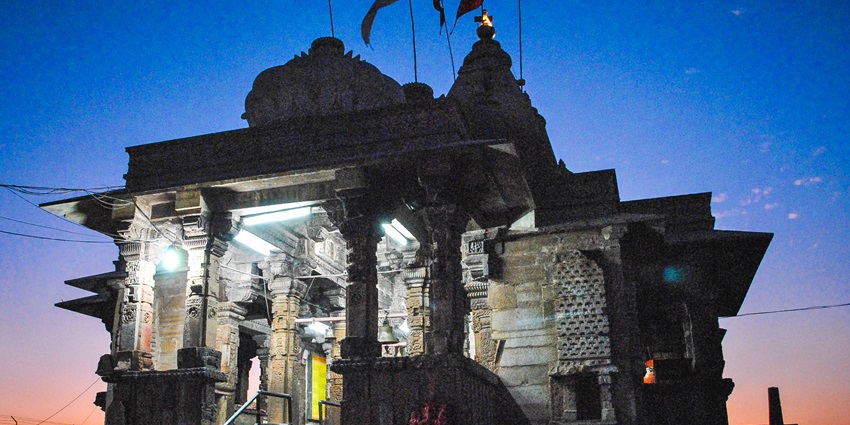
Photo: Sujay25 / Wikimedia Commons
For religious visitors, you can stop to seek blessings from the Kalika Mata Temple. The temple is located on top of a hill, which offers stunning panoramic views of the city. The trek to this temple is one of the most refreshing things to do in Rajasthan. The temple was originally built in the 8th century during which it was dedicated to the Sun God. It was later in the 14th century that it was transformed into the Kali temple.
Distance From The Fort: 3 Km
Suggested Read: A Pilgrim’s Guide To Kiradu Temples In Rajasthan’s Thar Desert
3. Mahanal Temple
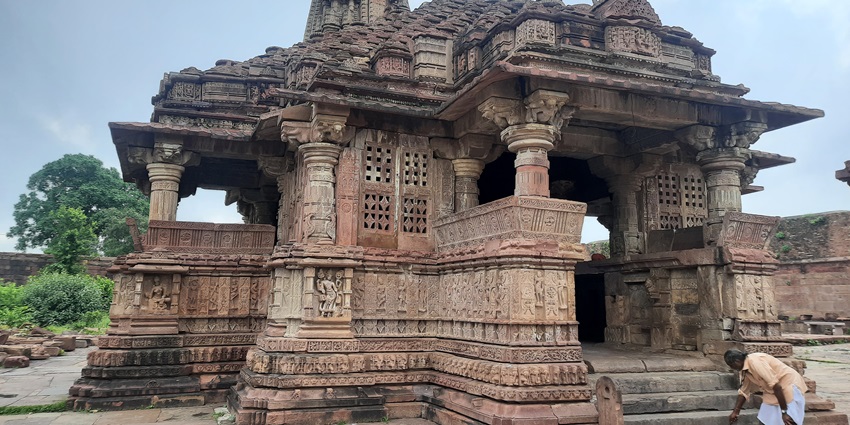
Photo: Parassmani / Wikimedia Commons
A short drive away from the Chittorgarh fort, Mahanal Temple is also a must-visit. The temple is primarily dedicated to Lord Shiva and a few other deities are also worshipped in the adjoining shrines. The majority of the temple is in ruins but it is still operational and open to tourists. You can also visit the waterfall that’s near the temple.
Distance From The Fort: 2.3 Km
4. Fateh Prakash Palace
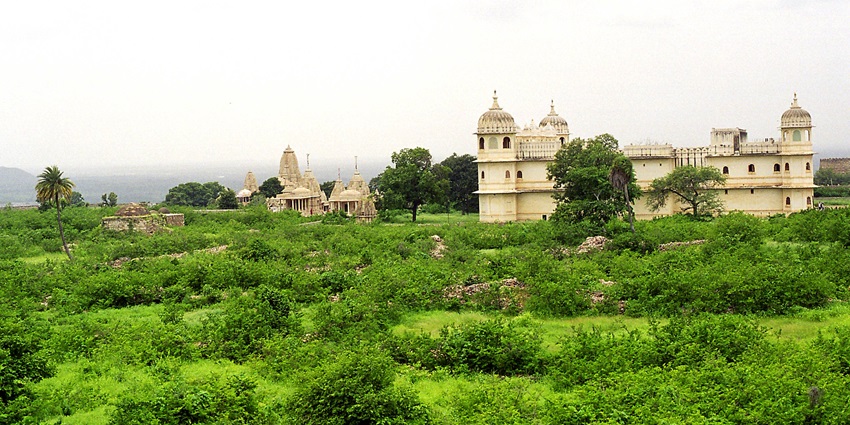
Photo: Shakti / Wikimedia Commons
Fateh Prakash Palace is a two-storeyed palace built by Rana Fateh Singh that is a perfect exhibit of modern Indian architecture. In 1968, a portion of the palace was converted into a public museum that houses weapons, sculptures, art, coins, wooden crafts, and other artefacts. Apart from this, there are clay replicas of regional tribal clad in their traditional costumes as well.
Distance From The Fort: 1.8 km
Suggested Read: A Journey Through Rajasthan Forts
5. Vijay Stambh
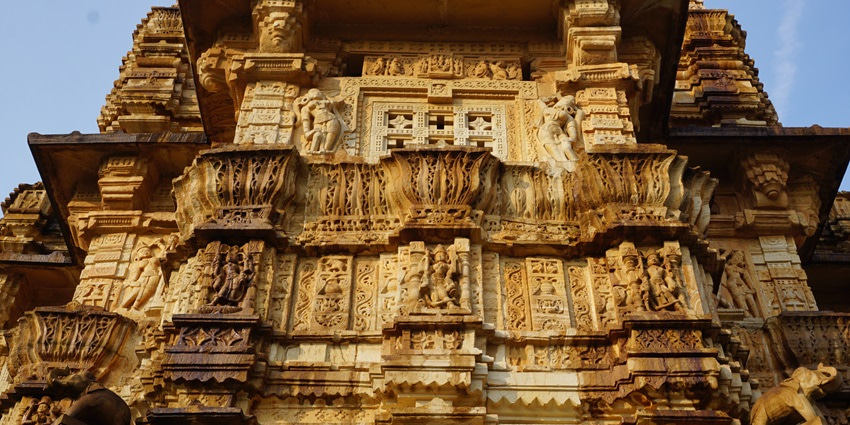
Photo: Deepank Ranka / Wikimedia Commons
This landmark was built in 1440 AD by Maharana Kumbha to celebrate the victory of Mewar over the armies of Malwa and Gujarat, led by Mahmud Khilji. Vijay Stambh literally translates into “Tower of Victory,” and is a nine-storeyed structure with over 157 steps that lead to the terrace. The visitors can admire the Rajput-style architecture and witness enchanting views of the entire city of Chittorgarh from the terrace.
Distance From The Fort: 2.1 km
6. Sathis Deori Temple
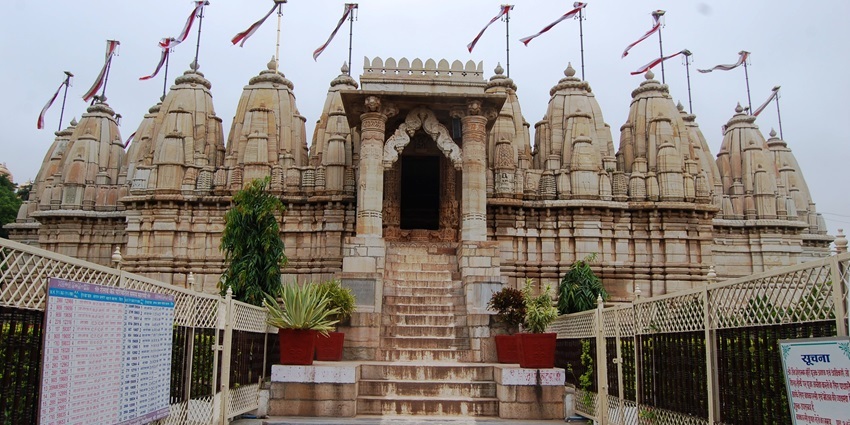
Photo: Ssjoshi111 / Wikimedia Commons
Sathis Deori Temple is a group of twenty-seven temples that have been dedicated to Jain Teerthankaras. Also known as Sattavish Deori Temple, it has been declared a UNESCO World Heritage Site. The temple is of great religious significance to the Jain community with Bhagwan Adinatha residing as the main deity. Built in the 11th century, the temple exhibits intricately carved architecture, further attracting history buffs as well, making it one of the top historical places to visit in Rajasthan.
Distance From The Fort: 2.6 km
Suggested Read: Jain Temples In Rajasthan
7. Bassi Wildlife Sanctuary
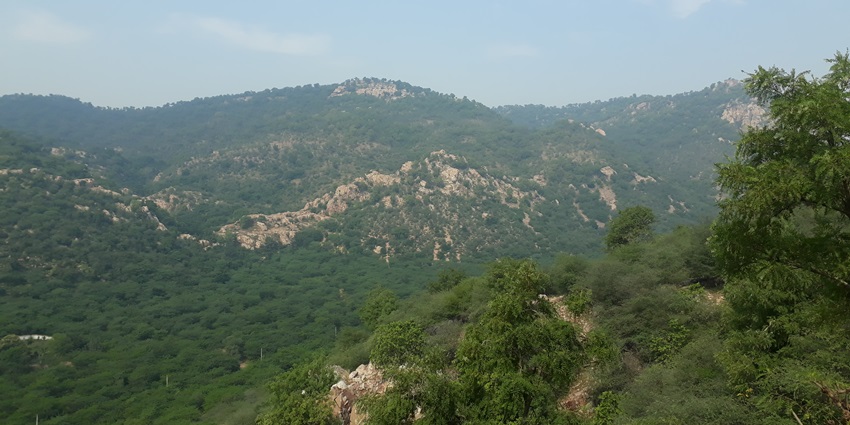
Photo: Pinakpani / Wikimedia Commons / Image For Representation Only
Situated roughly 5 kilometres north-east of Chittorgarh Fort, Bassi Wildlife Sanctuary spans 15,290 hectares at the western edge of the Vindhyachal Ranges, making it one of the most offbeat places in Rajasthan. Established in 1988, its dry deciduous woodlands of dhok, churel and butea trees shelter antelope, wild boar, panther, mongoose and a host of migratory birds. The sanctuary includes the tranquil Bassi and Orai dams, whose waters attract herons and cranes, while guided jeep safaris wind along gentle slopes and hidden water channels, revealing Rajasthan’s wild heart just a short drive from the historic fort.
Distance From The Fort: 5 km
8. Menal Waterfall
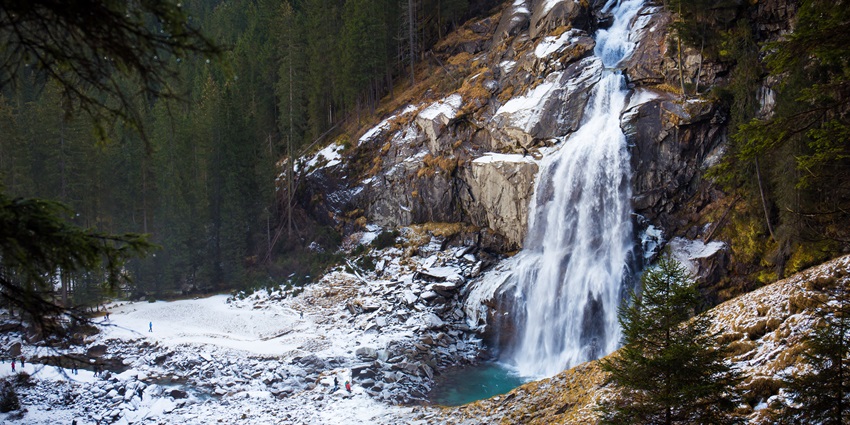
Photo: Greg_Men / Wikimedia Commons /. Image For Representation Only
Menal Waterfall lies roughly 90 kilometres from Chittorgarh Fort along the Chittor-Bundi Road in the tranquil village of Menal. This majestic cascade plunges over 150 feet into an emerald pool framed by lush forest and nearby 11th-century temple ruins. A short, one-kilometre trek from the roadside takes you through shady undergrowth to a viewing point above the falls. Best experienced during the monsoon when water volume surges, nature lovers and photographers will appreciate the scenic backdrop and serene atmosphere.
Distance From The Fort: 90 km
Suggested Read: Best Places To Visit Near Chittorgarh
9. Sanwariyaji Temple
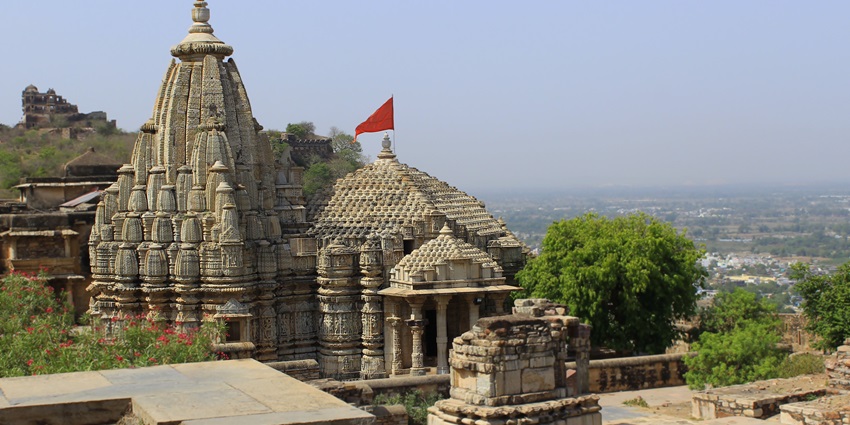
Photo: Sucheta Nag / Wikimedia Commons / Image For Representation Only
Sanwariyaji Temple, dedicated to Lord Krishna, stands about 40 kilometres south-west of Chittorgarh Fort along the Chittorgarh-Udaipur Highway. Its gleaming pink-sandstone façade and colourful carvings draw the eye, while the dark-stone idol of Krishna inside is famed for blessing traders with prosperity. Built in the mid-19th century on the dream of a local milkman, the temple comes alive during Janmashtami, when evening aarti fills the air with devotional song. With free entry, generous roadside parking and basic refreshment stalls nearby, it makes a serene spiritual detour from the fort’s ramparts.
Distance From The Fort: 40 km
Chittorgarh Fort in Rajasthan is one of the most historically significant spots in the state. Being the biggest fort in India, the allure of this place increases with each passing day. Its magnificent architecture, captivating history, and scenic beauty make it a must-visit destination whenever you are planning a trip to Rajasthan. You can sort out all your bookings with TripXL for the best deals and discounts.
Cover Photo: Mayank Gaur / Unsplash


 WhatsApp
WhatsApp
 Twitter
Twitter









